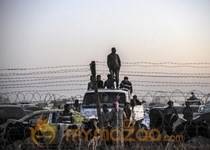Some 130,000 Kurdish refugees fleeing Islamic militants have crossed the border from Syria into Turkey in the past four days, Turkey's deputy prime minister said Monday as fighting raged close to Turkey's southern border.
The minister, Numan Kurtulmus, warned that Turkey was facing "a refugee wave that can be expressed by hundreds of thousands."
"This is not a natural disaster... what we are faced with is a man-made disaster," Kurtulmus said of the surge of mostly women, children and the elderly that started late Thursday.
The situation has raised tensions between Turkish authorities and Kurds, who claim the government is hampering their efforts to help their brethren in Syria by refusing to let Turkish Kurds cross into Syria. New clashes Monday erupted along the border near the town of Suruc, with Turkish police firing tear gas and water cannons to disperse Kurds protesting the government or demanding to reach Syria.
The conflict in Syria had already pushed more than a million people over the border since it began in March 2011. Refugees on Sunday reported atrocities by Islamic fighters that included stonings, beheadings and the torching of homes.
"We don't know how many more villages may be raided, how many more people may be forced to seek refuge," Kurtulmus said. "An uncontrollable force at the other side of the border is attacking civilians."
Suruc itself was flooded with refugees and armored military vehicles.
The al Qaeda breakaway group -- which says it has established an Islamic state, or caliphate, ruled by a harsh version of Islamic law in territory it captured straddling the Syria-Iraq border -- has recently advanced into the Kurdish regions of Syria that border Turkey.
Turkey had previously been reluctant to take part in international efforts against the group, citing the safety of 49 citizens taken hostage in June when the Islamic group overran the Iraqi city of Mosul. But on Saturday, Turkey secured the hostages' release but would not say how. President Recep Tayyip Erdogan has denied paying a ransom but has been vague on whether there was a prisoner swap.
U.S. Secretary of State John Kerry said Monday the United States now expects Turkey to step up in the fight against the militants.
Fighting raged Monday between Kurdish fighters and the militants near the northern Syrian city of Kobani, the Britain-based Syrian Observatory for Human Rights said. Parts of the city are within a mile of the Turkish border.
The Observatory said the militants have lost at least 21 fighters since Sunday night, most of them on the southern outskirts of Kobani.
Nawaf Khalil, a spokesman for Syria's Kurdish Democratic Union Party, or PYD, told The Associated Press the situation on the ground "is better than before." He said the main Kurdish force in Syria, the People's Protection Units, had pushed Islamic State fighters 6 miles away from previous positions east of Kobani.
"We will fight until the last gunman in Kobani," Khalil said.







